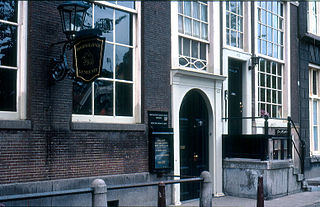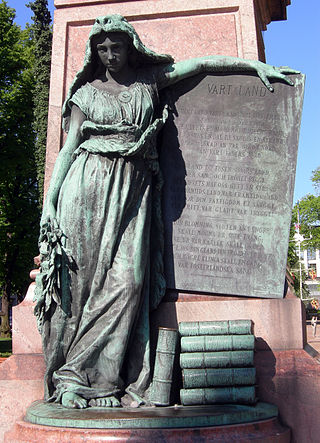
The Mennonite Church in the Netherlands, or Algemene Doopsgezinde Sociëteit, is a body of Mennonite Christians in the Netherlands. The Mennonites are named for Menno Simons (1496–1561), a Dutch Roman Catholic priest from the Province of Friesland who converted to Anabaptism around 1536. He was re-baptized as an adult in 1537 and became part of the Dutch Anabaptist movement.

The Flemish Movement is an umbrella term which encompasses various political groups in the Belgian region of Flanders and, less commonly, in French Flanders. Ideologically, it encompasses groups which have sought to promote Flemish culture and the Dutch language as well as those seeking greater political autonomy for Flanders within Belgium. It also encompasses nationalists who seek the secession of Flanders from Belgium, either through outright independence or unification with the Netherlands.

Pan-Africanism is a worldwide movement that aims to encourage and strengthen bonds of solidarity between all indigenous peoples and diasporas of African ancestry. Based on a common goal dating back to the Atlantic slave trade, the movement extends beyond continental Africans with a substantial support base among the African diaspora in the Americas and Europe.

Prostitution in the Netherlands is legal and regulated. Operating a brothel is also legal. De Wallen, the largest and best-known Red-light district in Amsterdam, is a destination for international sex tourism.

The New Communist Party of the Netherlands is a communist party in the Netherlands. The NCPN was founded in 1992 by the former members of the Communist Party of the Netherlands to oppose CPN's merger into the left-wing GroenLinks. These members have been known as "the Horizontals". Through the Stichting HOC, the NCPN releases the monthly newspaper Manifest.
First-wave feminism was a period of feminist activity and thought that occurred during the 19th and early 20th century throughout the Western world. It focused on legal issues, primarily on securing women's right to vote. The term is often used synonymously with the kind of feminism espoused by the liberal women's rights movement with roots in the first wave, with organizations such as the International Alliance of Women and its affiliates. This feminist movement still focuses on equality from a mainly legal perspective.
The German Youth Movement is a collective term for a cultural and educational movement that started in 1896. It consists of numerous associations of young people that focus on outdoor activities. The movement included German Scouting and the Wandervogel. By 1938, 8 million children had joined associations that identified with the movement.

African nationalism is an umbrella term which refers to a group of political ideologies in West, Central, East and Southern Africa, which are based on the idea of national self-determination and the creation of nation states. The ideology emerged under European colonial rule during the 19th and 20th centuries and was loosely inspired by nationalist ideas from Europe. Originally, African nationalism was based on demands for self-determination and played an important role in forcing the process of decolonisation of Africa. However, the term refers to a broad range of different ideological and political movements and should not be confused with Pan-Africanism which may seek the federation of many or all nation states in Africa.

The history of the Jews in the Netherlands largely dates to the late 16th century and 17th century, when Sephardic Jews from Portugal and Spain began to settle in Amsterdam and a few other Dutch cities, because the Netherlands was an unusual center of religious tolerance. Since Portuguese Jews had not lived under rabbinic authority for decades, the first generation of those embracing their ancestral religion had to be formally instructed in Jewish belief and practice. This contrasts with Ashkenazi Jews from central Europe, who, although persecuted, lived in organized communities. Seventeenth-century Amsterdam was referred to as the "Dutch Jerusalem" for its importance as a center of Jewish life. In the mid 17th century, Ashkenazi Jews from central and eastern Europe migrated. Both groups migrated for reasons of religious liberty, to escape persecution, now able to live openly as Jews in separate organized, autonomous Jewish communities under rabbinic authority. They were also drawn by the economic opportunities in the Netherlands, a major hub in world trade.

Dutch art describes the history of visual arts in the Netherlands, after the United Provinces separated from Flanders. Earlier painting in the area is covered in Early Netherlandish painting and Dutch and Flemish Renaissance painting.

Moralism is a philosophy that arose in the 19th century that concerns itself with imbuing society with a certain set of morals, usually traditional behaviour, but also "justice, freedom, and equality". It has strongly affected North American and British culture, concerning private issues such as the family unit and sexuality, as well as issues that carry over into the public square, such as the temperance movement.

The Indonesian National Awakening is a term for the period in the first half of the 20th century, during which people from many parts of the archipelago of Indonesia first began to develop a national consciousness as "Indonesians".

The Dutch East Indies, also known as the Netherlands East Indies and Dutch Indonesia, was a Dutch colony with territory mostly comprising the modern state of Indonesia, which declared independence on 17 August 1945. Following the Indonesian War of Independence, Indonesia and the Netherlands made peace in 1949. In the Anglo-Dutch Treaty of 1824, the Dutch ceded the governorate of Dutch Malacca to Britain, leading to its eventual incorporation into Malacca (state) of modern Malaysia.
The International Service Fellowship, more commonly known as Interserve, is an interdenominational Protestant Christian charity which was founded in London in 1852. For many years it was known as the Zenana Bible and Medical Missionary Society and it was run entirely by women.
Pillarisation is the vertical separation of citizens into groups by religion and associated political beliefs. These societies were divided into two or more groups known as pillars. The best-known examples of this have historically occurred in the Netherlands and Belgium.
The temperance movement in the United Kingdom was a social movement that campaigned against the recreational use and sale of alcohol, and promoted total abstinence (teetotalism). In the 19th century, high levels of alcohol consumption and drunkenness were seen by social reformers as a danger to society's wellbeing, leading to social issues such as poverty, child neglect, immorality and economic decline. Temperance societies began to be formed in the 1830s to campaign against alcohol. Specific groups were created over periods of time dedicated to the different aspects of drinking. For example, in 1847, the Band of Hope was created to persuade children not to start drinking alcohol. Most of these temperance groups were aimed at the working class. Temperance was also supported by some religious groups, particularly the Nonconformist Churches. Although the temperance movement met with local success in parts of Britain, it failed to impose national prohibition, and disappeared as a significant force following the Second World War.

Shasipada Banerjee was a teacher, social worker and leader of the Brahmo Samaj who is remembered as a champion of women's rights and education and as one of the earliest workers for labour welfare in India. He was the founder of several girls' schools, a widow's home, temperance societies, a workers' organisation and the editor of the journal Bharat Sramajibi.
In the Netherlands, feminism began as part of the first-wave feminism movement during the 19th century. Later, the struggles of second-wave feminism in the Netherlands mirrored developments in the women's rights movement in other Western countries. Women in the Netherlands still have an open discussion about how to improve remaining imbalances and injustices they face as women.

Women in Finland enjoy a "high degree of equality" and "traditional courtesy" among men. In 1906, the women of Finland became the first women in Europe to be granted the right to vote. There are many women in Finland who hold prominent positions in Finnish society, in the academics, in the field of business, and in the government of Finland. An example of powerful women in Finnish politics is Tarja Halonen, who became the first female president of the country. In religion, where most of the Finnish people are members of the Evangelical Lutheran Church of Finland, women can be ordained as priests. In terms of finance, Finnish women have been described as "usually independent financially". The Telegraph wrote in 2006:
Finnish women are much more outgoing and approachable than the men and often command three or four languages. Their position in society and business is well-respected and superior to that of women in most other cultures.

Johanna Wilhelmina Antoinette Naber was a Dutch feminist, historian and author during the first feminist wave. She was one of the three founders of the International Archives for the Women's Movement (1935), now known as Atria Institute on gender equality and women's history, and was herself a prolific author of historical texts about influential women and the women's movement.













